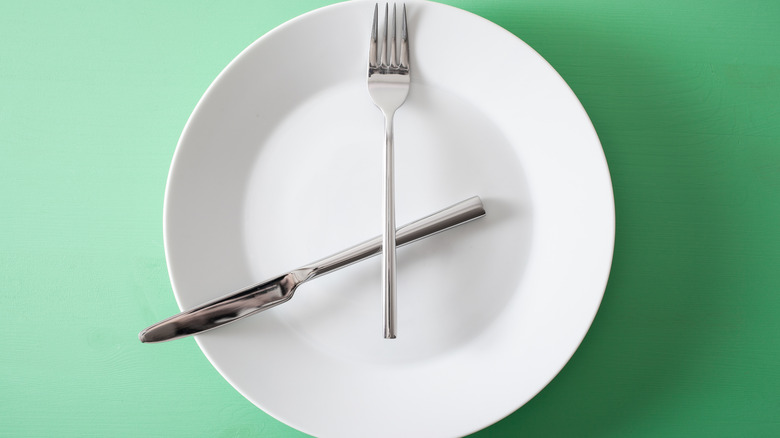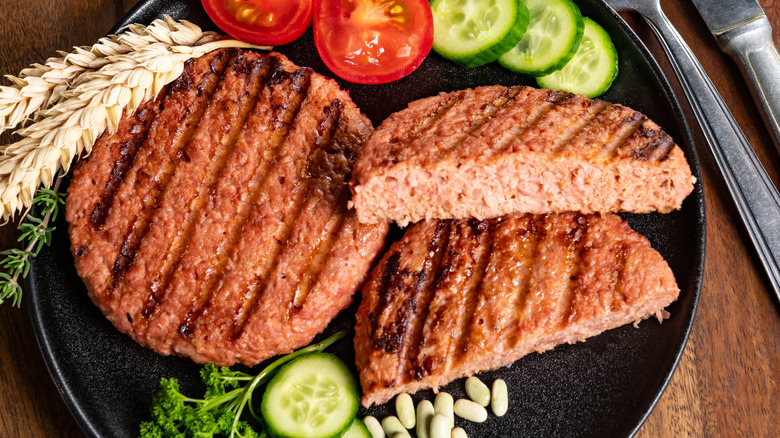Things You Should Never Do While Fasting
Fasting has been a practice undertaken by people since long before we were all born, but its purpose has expanded over time. A component of religious practice in a large number of faiths, fasting was also theorized to have a therapeutic benefit in ancient Greece — but in the health world, fasting has gained recent prominence for its potential for weight management (per WebMD). Intermittent fasting, which involves fasting on specific days of the week, has skyrocketed in popularity in recent years, with the practice proving to be an appealing option for individuals who are interested in weight loss (per Harvard Health).
But as with any alteration to diet and lifestyle, fasting comes with its own set of health considerations. And perhaps more than other dietary practices, if you're embarking on a fast or a new fasting regimen, it's vital that you know how to look after your body during a period where it'll be getting little, or no, food at all. That's why we wanted to lay out the top things you shouldn't be doing while fasting, to make sure your experience is as easy as can be.
Start too quickly
When fasting, it's easy to jump in with both feet and commit fully. After all, all you have to do is not eat ... How hard can it be, right? Well, as it turns out, it can be not only difficult but counterproductive to go from 0 to 100 on the fasting front. This can particularly be the case with people who are new to intermittent fasting, who jump straight into a 24-hour fasting window, only to find that it quickly becomes a nightmare (per Mind Body Green). This can lead to things stalling before they even get started.
Instead, we thoroughly recommend you ease into fasting. Begin with smaller periods of fasting, and build up — many people find the 16:8 ratio, where you fast for 16 hours and then eat within an eight-hour window, to be a good middle ground and the most sustainable approach (per Healthline). There's a reason why it's the model of intermittent fasting that most people follow. You might also find that a model like the 5:2 diet, where you limit food intake two days of the week and eat normally on the other days, works better for you. Ultimately, it's about understanding what's best for your body.
Eat too much when your fast breaks
So, you've got through your fast. Congratulations! Fasting is no small thing, and it's important to reward yourself with a good meal. But while we understand the enthusiasm of breaking fast with delicious food, it's important to go into it with a clear head. "It can be easy to overeat when a fast breaks, either because you're feeling ravenous or you justify to yourself that you're making up for lost calories," explains Villanova University's College of Nursing dietitian Libby Mills to EatingWell. Unfortunately, this can then result in going from hungry to too full, becoming counterproductive to all the hard work you put into your fast — and causing a blood sugar and insulin spike that may make you feel unwell (per Simple).
So the next time you break your fast, remember to keep things in moderation. It's useful to rate your hunger on a scale of 0 to 10 and eat accordingly, says Mills. Another prudent move is to eat your post-fast meal slower than you might normally do, which gives your brain the time it needs to send you signals that you're full before you've eaten too much. On average, it can take up to 20 minutes for this to kick in, so keep that in mind as you eat (via EatingWell).
Forget to drink water
As fasting involves limiting food consumption, it's natural to want to be cautious about what passes your lips. But if your fast program permits you to drink water during your fasting period, it's important to do so. Becoming dehydrated during a fast is pretty easily done, due to food providing a large proportion of the fluids we need daily (per Healthline). As such, it's important to compensate for this loss with additional water intake, either during or around your fast.
Without adequate hydration, we can become dehydrated very quickly. And dehydration is no joke. Given that, as we are often told, the body is 75% water, any alteration to that level can throw things out of equilibrium, with minor dehydration causing you to feel tired, become constipated, and experience headaches (per Medical News Today). Higher levels of dehydration can result in a drop in blood pressure, fever, kidney issues, and a loss of consciousness. The best way to keep tabs on your hydration levels is to check the color of your pee: When it's clearer, your hydration levels are in check, but darker urine can indicate that you need to take on some fluids.
Exercise too rigorously
Given that fasting has become the go-to option for weight management for people around the world, it's natural to assume that combining it with vigorous exercise might supercharge your weight loss efforts. But it's important to remember that working out too thoroughly when you're fasting might lead to problems, fast.
There are some potential benefits to working out in a fasted state, with the body responding to the lack of food energy sources by burning glycogen instead, meaning that you'll burn through fat faster (via Healthline). The problem, however, is that in addition to glycogen, the body also burns through muscle when you work out hard while fasting, reducing your overall muscle mass and making your body weaker. There's also the fact that when you don't fuel your body for exercise with nutritious food, "you're more susceptible to hitting the wall, which means you'll have less energy and not be able to work out as hard or perform as well," according to Virtual Health Partners Fitness Programming & Nutrition manager and registered dietitian Chelsea Amengual. And, if that wasn't enough, over time, a combo of fasting and copious exercise may lead to a slower metabolism.
Break your fast with the wrong things
Anyone who's ever fasted will tell you how satisfying the moment is when the clock shifts euphorically past your allotted time, and everything you weren't able to eat is back on the table. But before you start preparing your fast-breaking meal, remember that there are certain choices to be made — and completing your fasting period doesn't necessarily mean you should go for anything you want, as Livestrong says.
Instead, it's important to keep your post-fast meal in line with basic nutritional principles, to make sure that you're eating healthily around your fasting. Try and prioritize lean proteins, healthy fats, and whole grains in anything you eat around your fast, says Harvard Health Publishing. Good amounts of fruit and vegetables, full of vitamins, minerals, and fiber, should also be a staple of your diet, with pulses like beans and lentils also being a super-healthy option. Ideally, you want to limit the number of refined grains, sugar, and unhealthy fats that you're eating. Following the principles of a Mediterranean diet is a good rule of thumb, both around nutrition in general and when planning how to break your fast.
Fast without considering your medication
Fasting isn't just limiting what you eat on a day-to-day basis. It is, essentially, a lifestyle shift, and any new lifestyle change should be considered in the context of any other health factors. This includes any pre-existing medical conditions you have, as well as any medication you might be taking for them. If you're taking medication for blood pressure or a heart condition, for example, you may find that the levels of your electrolytes or minerals like sodium or potassium might be less balanced, which may be exacerbated by a period of fasting (via Harvard Health Publishing).
It's also worth bearing in mind that certain medications can't be taken on their own, making fasting a problem. "People who need to take their medications with food — to avoid nausea or stomach irritation — may not do well with fasting," says Beth Israel Deaconess Medical Center associate chief of gerontology Suzanne Salamon. Individuals who take medication for diabetes are also advised to be very careful around fasting and combining it with their healthcare plan for the condition. If in any doubt at all, it's highly important to talk it over with your doctor.
Overdo it on your fasting regimen
If you're just starting on a fasting regime, it's easy to get overcome with enthusiasm. But fasting too rigorously can become a problem very quickly. There's a fine line between fasting and restricting calories to an unhealthy degree, and avoiding the consumption of calories too rigorously over a longer time may result in bone loss (per EatingWell). You also run the risk of tiring of fasting before you even get started if you're reducing your intake too extremely.
Instead, it's important to start slow, to avoid any health issues or feelings of resentment around a fast. "If you normally eat every 3–4 hours and then suddenly shrink your eating period to an 8-hour window, you'll likely feel hungry all the time and discouraged," advises registered dietitian Libby Mills. Begin really slowly, and make small adjustments to build up to a bigger fasting window. The most important thing to do, though, is to pay attention to what your body's telling you. If it's telling you that you need to eat, you probably need to eat.
Ignore your other lifestyle factors
Fasting doesn't exist in a vacuum: It's a large change to your life, that will naturally affect, and go hand-in-hand with, the other aspects of your day-to-day existence. That's why making sure you're living healthily and taking good care of your physical and mental health around your fast is so important. And it starts with the simple things: Getting a good night's sleep every night, keeping an eye on your stress and anxiety levels and general mental health, and living an active, sociable, and enriching lifestyle, says Mind Body Green.
These things are important all the time, but when you're fasting, they take on perhaps an even greater significance. Living a healthy lifestyle around your eating habits helps you to maintain your fast with greater ease, and makes it a worthwhile experience, not an arduous one. It's also important to remember that eating well around your fast has an impact on your sleep habits and mental health, with a good, nutritious diet and ample hydration serving to bolster your mood, concentration levels, and general health (per the Mental Health Foundation).
Not listen to warning signs your body sends you
For a lot of people, fasting for the first time may push the body into states that it's unfamiliar with, especially if you're used to eating every four hours on the dot. And that's why it's super important to pay close attention to how your body reacts to fasting and to be responsive to any warnings it sends out. Naturally, an increased feeling of hunger and some dips in energy are part and parcel of not eating for extended periods, but if your fatigue gets to a point where you can't carry out your day-to-day activities, or if you start to feel especially weak, it might be a sign to stop fasting, says Healthline.
Another potential warning sign to look out for is difficulty or disruption while sleeping, according to Business Insider. People who are fasting may also experience hair loss or have changes in their menstrual cycle. Crucially, too, the warning signs for fasting may not just be physical: If you find yourself obsessing over your fasting, or having increased stress or anxiety, it's important to consider your fasting regimen and seek treatment from a healthcare professional.
Avoid eating or drinking everything you used to
Depending on the type you're following, when you embark on a fast, it may be that you pivot to consuming nothing entirely. But for certain types of fasts like intermittent fasting, this may not actually be necessary to do, and you might be able to have more than you think without altering its effectiveness.
Take coffee, for instance. If you're used to a couple of cups of black coffee a day, it's unlikely that you'll have to give them up during your fasting period, says Healthline. This is because black coffee, with its fairly minimal nutritional composition and low calories, will not deliver a notable change to your metabolic function or blood sugar, according to research published in Diabetes Care. In other words, you won't break your fast with that cup of Joe.
Bear in mind, though, that while black coffee is perfectly fine to drink on a fast, adding anything to it, like creamer or sugar, will alter its effect on your body and might disrupt your fast. It's also worth noting that if the purpose of your fast is to generate more insulin sensitivity, you might want to keep your coffee consumption minimal. High amounts of coffee intake appear to decrease insulin sensitivity, per the Diabetes Care research — although that was observed in people drinking more than ten cups a day. We don't know about you, but we don't love coffee that much.
Forget about your protein
From our muscles to our skin, our bones to our hair, most things in our body need protein. But when we're fasting, it can be easy to forget the importance of maintaining adequate protein levels in our diet — and when this goes out of the window, things can start to go south pretty fast.
Ensuring you get enough protein is essential around a fast, particularly due to its contribution to maintaining muscle mass. When you're losing body mass during a fast, your body can start to use muscle as fuel to keep running. Eating enough protein can assist in minimizing muscle loss, according to research published in Advances in Nutrition.
Not getting enough protein doesn't just impact your muscles, too. Eating higher amounts of protein will keep you fuller for longer, says EatingWell, which may help you stave off hunger pangs during fasting intervals. Given that protein impacts bone and hair health, it's also important to consume enough to keep them strong, and reduce the risk of breakage (both in terms of brittle hair and bone fractures). We also need enough protein to keep our immune system strong and healthy. In short? Eat your protein, folks.
Lose track of your vitamin and mineral intake
Fasting is a delicate balance of reducing the amount of food you eat, while also ensuring that you're eating enough to supply your body with the goodies it needs. And especially important are the vitamins and minerals you get from this food, which can quickly go out of the window during a fasting program. This is a problem not just for people who follow fasts to lose weight, but more generally for people following diet plans, according to research published in the Journal of the International Society of Sports Nutrition. Researchers found that across the board, folks who followed diets designed for weight loss had lower levels of micronutrients, with "consistently low or nonexistent" levels of six specific nutrients: vitamins B7, D, and E, as well as chromium, iodine, and molybdenum.
Making sure you're eating healthily, with micronutrients in mind, around a fast will help reduce deficiency levels, but if your fast is lengthy or more restrictive, you may struggle to get what you need (via Healthline). Taking vitamin and mineral supplements may allow you to top up your micronutrient levels. Just make sure that any supplements you're taking aren't unintentionally breaking your fast.
Forget that it's a lifestyle choice, not just a quick fix
When we start intermittent fasting, it's all too easy to assume that we'll do it for a few weeks — a few days, even — and everything will be perfect in our lives again. But it's important to remember that a fast is not a short-term solution, but a long-term adaptation to the way that we approach food entirely, and keeping that in mind will not make your fasting endeavors infinitely more successful, but will positively impact your relationship with food as a whole. "Shifting the focus to being more intuitive about when you eat based on your sensation of hunger and fullness is something that makes sense for a lifetime," says registered dietitian Libby Mills to EatingWell.
This also extends to not just how you eat, but what you eat. By approaching what you choose to eat around your fast from a perspective of looking for the most nutrient-rich options, you adapt your focus from "a calorie-counting mindset to a quality of life focus," says Mills. Even after you finish fasting, the lessons you learn from it will carry on benefitting you.
Give up too quickly
Perhaps the hardest part of doing anything that has long-term results is seeing it through to the end, but let's face it, folks. Fasting can be hard. And that's why for a lot of people, it's far easier to call it quits after just a few days. We definitely get that.
It's worth keeping in mind, though, the timescale of how long intermittent fasting takes to work. On average, it takes around a week and a half to start noticing changes in your body from a fasting program, and it could take up to two and a half months for any significant shifts in your body weight to occur, says HealthCanal. Some people might take longer than that, too — for some, weight loss might not start to occur until well beyond the two-week mark. And don't expect to lose a huge amount at once, either. Around a pound a week is a good benchmark to strive for, as a sustainable progression. And if you're not noticing any change after a significant amount of time, it might be worth interrogating how you're fasting. There may be a host of reasons why it's not working, from not drinking enough water to not consuming enough protein. The main thing to remember, though: Don't give up!















